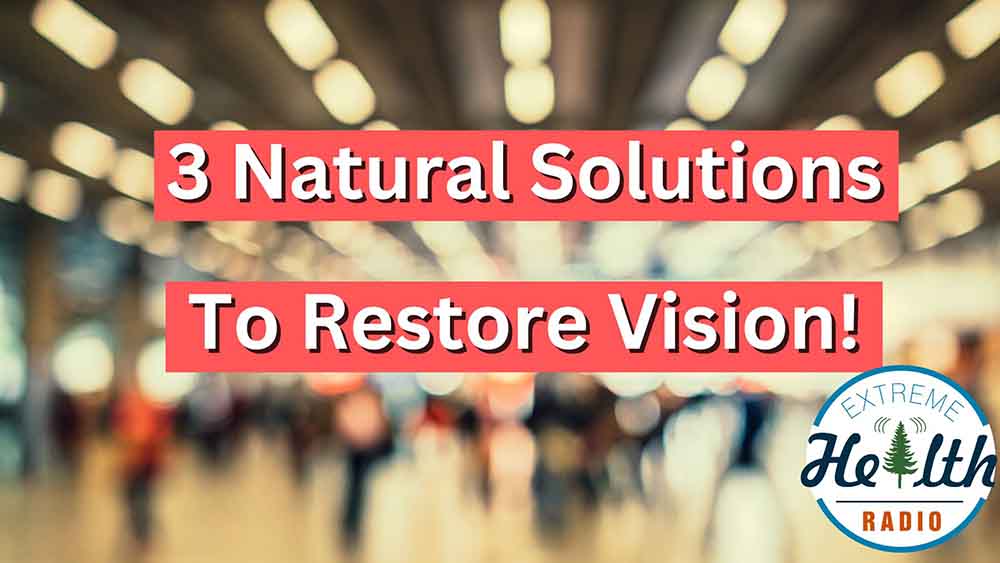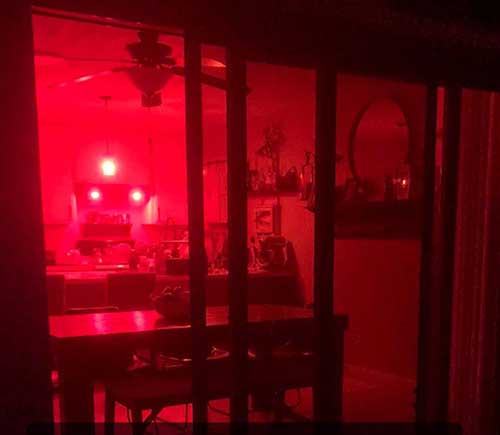
If you’re losing your eyesight, there are natural remedies you can do to stop losing your vision and improve the overall health of your eyes.
These natural remedies are mostly unknown to eye doctors, but they’re backed by science.
My mom right now is dealing with wet macular degeneration which was the impetus for creating my Vision Protocol.
More and more people are losing their eyesight and wanting to know how to get better vision naturally.
Why is this happening?
According to my research that main drivers in poor vision are diabetes, blue light and inflammation mostly from seed oils. With everybody addicted to their phones we’re going to see a generation of older people that are blind. Mark my words.
If I wanted to invest and make incredible profits, I’d invest in companies that will be taking care of blind people or products that do the same. My generation (I was born in 1975) is most definitely going to be 100% blind by the age of 75.
I’m convinced of it.
This is why I’m actively making sure I don’t consume vegetable oils or look at blue light without protection. See studies below about this.
What good is it to live until you’re 90 if you can’t see?
I’m a first hand witness to this with my mom right now and it makes me so sad. Losing your vision is one of the worst things that can happen and it’s mostly preventable.
Anatomy & Function of the Eye
Let’s look at the absolute brilliant design of the human eye…
Anatomy
The eye is considered to be a “brain extension” in that it’s the only organ outside of the body that you can see from the outside. It’s actually part of your brain and nervous system. Here are some of the parts of the human eye.
- Cornea
- Sclera
- Conjunctiva
- Iris
- Pupil
- Lens
- Retina
- Macula
- Fovea
- Optic Nerve
- Vitreous Humor
- Aqueous Humor
- Ciliary Body
- Choroid
- Zonules (suspensory ligaments)
- Optic Disc (Blind Spot)
Function
Most people think that their eyes act like a camera but that’s not entirely correct. Your eyes function more like a clock than a camera.
How do my eyes function as a clock you say?
Through light.
Light is a complex subject but its impact on our biology is incredibly profound. All light is comprised of color, frequencies, lux and more. Here’s a list of all the different ways light is characterized and measured…
- Wavelength
- Frequency
- Color Temperature
- Intensity (or Amplitude)
- Speed
- Polarization
- Phase
- Coherence
- Spectral Power Distribution (SPD)
- Color Rendering Index (CRI)
- Luminous Flux
- Luminous Intensity
- Illuminance
- Irradiance
- Photon Energy
- Angular Frequency
- Refractive Index
- Reflectance
- Transmittance
- Scattering
- Absorption Coefficient
- Emission Spectrum
- Luminescence
- Fluorescence and Phosphorescence
- Optical Density
- Chromaticity
Your eyes take in photons of light and your body reacts according to what kind of light comes in.
Depending on the time of day (assuming sunlight of course) each one of those 25 different classifications of light will be different.
Here’s how that works when light comes into your eyes. It goes from…
Light Photons → Pupil → Lens → Vitreous Humor → Retina → Phototransduction → Optic Nerve → Optic Chiasm → Optic Tract → Suprachiasmatic Nucleus (SCN) → Paraventricular Nucleus (PVN) of the Hypothalamus → Intermediolateral Cell Column (IML) in the Spinal Cord → Superior Cervical Ganglion (SCG) → Pineal Gland
When light hits the SCN which is your master circadian clock there are hundreds of biological process that happen in nanoseconds. Certain hormones get turned on, while others turn off. Some hormones may dial themselves down in their secretion patterns while others may titrate up and secrete more hormones based on which frequencies are coming in.
Same is true with enzymes. Some activate and some do not, all based on light.
The frequency of light and the time of day sets all the clocks in your body. It’s the master time piece for your internal circadian rhythm.
What do you think happens when we wear sunglasses (that alter these frequencies) or contact lenses (which cause hypoxia to your eye) which also filter these frequencies? The wrong timing signals get sent to your SCN which then gives the wrong signals to every other cell in your body.
This is what people call “circadian mismatches“.
What does this have to do with your vision?
A lot.
But my point is to show you that your eye (although yes it does “see” the world around us) functions more like a clock than a camera.
So how do you get better vision naturally? Stop participating in the causes of all vision disorders.
Eye Conditions
Here’s a list of eye conditions below. What I want you to know is that the body works as a whole. What’s good for macular degeneration is also going to be good for cataracts or myopia. Yes you may need to tailor specific nutrients and therapies for certain conditions but the eye works as a single unit.
It’s like drinking pure water. Yes better hydration is good for your brain but it’s also good for your liver and lungs too.
As we age we decrease our redox potential, that is the energy required to donate an electron to reduce oxidation (aka redox). As oxidation increases so does inflammation and calcification. There’s also a decrease in oxygenation in the areas of your eye. When oxygen and red blood cells cannot get into different areas of your eye, they tend to atrophy and calcify.
When this happens, the process of disease happens, no matter where in the body it occurs.
Do you have any of these conditions below?
- Myopia (Nearsightedness)
- Hyperopia (Farsightedness)
- Astigmatism
- Presbyopia
- Cataracts
- Glaucoma
- Macular Degeneration (Age-related)
- Diabetic Retinopathy
- Retinal Detachment
- Conjunctivitis (Pink Eye)
- Dry Eye Syndrome
- Keratoconus
- Amblyopia (Lazy Eye)
- Strabismus (Crossed Eyes)
- Uveitis
- Blepharitis
- Color Blindness
- Night Blindness
- Retinitis Pigmentosa
- Optic Neuritis
- Floaters
- Eye Allergies
- Chalazion
- Hordeolum (Stye)
- Corneal Abrasion
- Pterygium
- Retinoblastoma
- Anisocoria (Unequal Pupil Size)
- Diplopia (Double Vision)
3 Main Causes of Blindness
Blue Light
High frequency blue light damages ocular tissues, which you do not want. You want to maintain cellular health in your eyes for as long as possible. I don’t recommend using any device without filtering it first. Ideally if you have a computer you’re using a Daylight Computer that emits zero blue light.
Mechanisms of blue light-induced eye hazard and protective measures: a review
“High-energy blue light can penetrate the cornea and lens and reach the retina directly, causing photochemical damage to the retina; this is called blue light hazard.”
“Mounting evidence suggests that overexposure to blue light induces a significant increase in ROS production, which contributes to the loss of photoreceptors, lipid peroxidation and cell apoptosis.”
“Emerging evidence indicates that blue light phototoxicity is not only limited to the retina; it also damages the ocular surface by oxidative stress and the inflammatory response.” – Source
If you do have a computer, I program I use and recommend is called Iris Tech. Typically during the daytime I’ll put my color temperature to 1885 kelvin (that looks more yellow) and after the sun sets I’ll set it to zero, meaning the screen is completely orange emitting zero blue light. The cool thing I like about Iris Tech is that it also significantly reduces the flicker from screens which is damaging to our nervous system.
Flicker in solid-state lighting: Measurement techniques, and proposed reporting and application criteria
“Flicker has been shown to induce photosensitive epilepsy, migraines and headaches, and increased autistic behaviors in certain people. Reduced task performance, stroboscopic or phantom array motion effects, distraction and annoyance are other possible consequences” – Source
Blue Light Exposure: Ocular Hazards and Prevention-A Narrative Review
Blue light exposure provokes photochemical reactions in most eye tissues, in particular the cornea, the lens, and the retina. In vitro and in vivo studies have shown that certain exposures to blue light (depending on the wavelength or intensity) can cause temporary or permanent damage to some structures of the eye, especially the retina. – Source
This also means protecting your eyes from high frequency blue light when on your devices. During the day I wear yellow blue blocking glasses (even when my windows are open and my Iris Tech settings are on 1885 kelvin, because I don’t trust my eye health to one company). When the sun sets I switch from yellow glasses to orange and then I turn my Iris settings to emit zero blue light.
Then two hours before bed I wear my red blue blocking glasses. And of course all the lights in our home are red.
Diabetes
We know that diabetics often have vision issues. Elevated blood sugar damages the tiny blood vessels in your retina, leading to diabetic retinopathy, which can seriously impact vision. Diabetes is the leading cause of blindness in people younger than 70, so you need to make sure your blood sugar levels are not too high.
Diabetic retinopathy – ocular complications of diabetes mellitus
“In industrialized nations diabetic retinopathy is the most frequent microvascular complication of diabetes mellitus and the most common cause of blindness in the working-age population.”
“Main reasons for loss of vision in patients with diabetes mellitus are diabetic macular edema and proliferative diabetic retinopathy. Incidence or progression of these potentially blinding complications can be greatly reduced by adequate control of blood glucose and blood pressure levels.”
“Diabetic retinopathy is the most common microvascular complication of diabetes mellitus… and is responsible for about 15% of all cases of legal blindness (best corrected visual acuity less than 0.02) in Germany.” – Source
If you suspect this is an issue, I would switch to a lower sugar diet similar to the Mediterranean diet a Paleo diet or Ketogenic diet. Avoid processed carbohydrates like the plague.
Along with avoiding sweets like cake, crackers, candy, ice-cream etc here are some supplements to help regulate your blood sugar.
Inflammation
Any inflammation in the body is going to have a particularly damaging effect in areas that receive the least blood flow. This is one reason why cavitations in the jaw being a major problem. There’s less blood flow there. Same goes with joints and ocular tissues. I cover all this and more in great detail in my Eagle Vision Protocol.
To counteract inflammation you need to stop participating in anything that causes inflammation like…
- Polyunsaturated fatty acids (PUFAs) – seed and vegetable oils
- Excess blue light exposure
- Wifi and nnEMF radiation
- Stress
- Process foods
- Chemicals
- Poor breathing habits
Healing The Eyes
Red light therapy particularly in the 670nm range has been shown to help restore the mitochondria in the drusen of the eye. The drusen which is mostly made up of oxidized lipids, indigestible proteins, heavy metals and chemicals is what causes the blindness in macular degeneration patients. By restoring adenosine triphosphate (ATP) energy production the body is then able to metabolize this drusen that’s causing blindness.
The other important treatment I would do is molecular hydrogen every day. Molecular hydrogen has the ability to repair DNA as the smallest antioxidant in the universe. You can get a pair of goggles that are especially outfitted with tubing that directs the flow of molecular hydrogen gas directly to your eyes. Personally I would do this therapy for 30 minutes per day.
I’m going to put a radio show below where we discussed this topic.
Blood & Capillary Health
Blood comes in to your eyes through veins and capillaries. If your blood is thick and viscous, it’s going to have a a more difficult time getting through these small areas like your ophthalmic artery, central retinal artery and ciliary arteries.
You may have two issues going on…
- Calcified veins or capillaries
- Viscous blood
Veins and Capillaries
You want your veins and capillaries to be strong yet flexible. Since they’re made of proteins and collagen the nutrients to focus on to strengthen the veins going to your eyes are…
- Collagen – ideally from chicken feet, pig ears or cow joints.
- Sulfur
- Silica
- Vitamin C
- Hawthorn
- Copper – (activates the enzyme lysyl oxidase which binds collagen and elastin together)
- Zinc
Blood
Regular blood donation and drinking high quality filtered water is where I would start. You could also clean your blood using devices like the Sota Silver Pulser which uses electricity on the radial and ulnar arteries to clean blood and a high quality B vitamin complex combined with magnesium.
Foods or Supplements To Include
- Vitamin E – Source
- Vitamin C – Source
- N-acetylcysteine – Source
- Quercetin – Source
- Resveratrol – Source
- L-carnitine – Source
- Astaxanthin – Source
- Bladderwrack – Source
- Grape Seed – Source
- Curcumin – Source
- Zeaxanthin – Source
- Lutein – Source
- Ginkgo Biloba – Source
- Moringa – Source
- Shilajit – Source
- Eyebright – Source
- Saffron – Source
- Blueberry – Source
- Bilberries – Source
- Vitamin A – Source
More Resources
- The Eagle Vision Protocol
- Take Off Your Glasses and See – Radio show
- Dr. Ed Kondrot – Radio show – Website
- Healing The Eye The Natural Way
- Dr. Sam Berne – Radio show – Website
- Blind Faith: Reverse Macular Degeneration Thru Diet & Nutrition
I did a radio show with Dr. Edward Kondrot below all about how to get better vision naturally, that you may find very interesting.
Bottom Line
Avoid and protect yourself from blue light, get off of seed oils and vegetable oils, regulate your blood sugar and start doing therapies like red light and molecular hydrogen. I’m leaving out a ton of information because I’ve included it all in my Eagle Vision Protocol that you should definitely get.
Questions:
- Are you currently dealing with a loss of vision?
- Do you wear contact lenses or reading glasses?
- Are you concerned about failing vision in the future?
Comment below!



